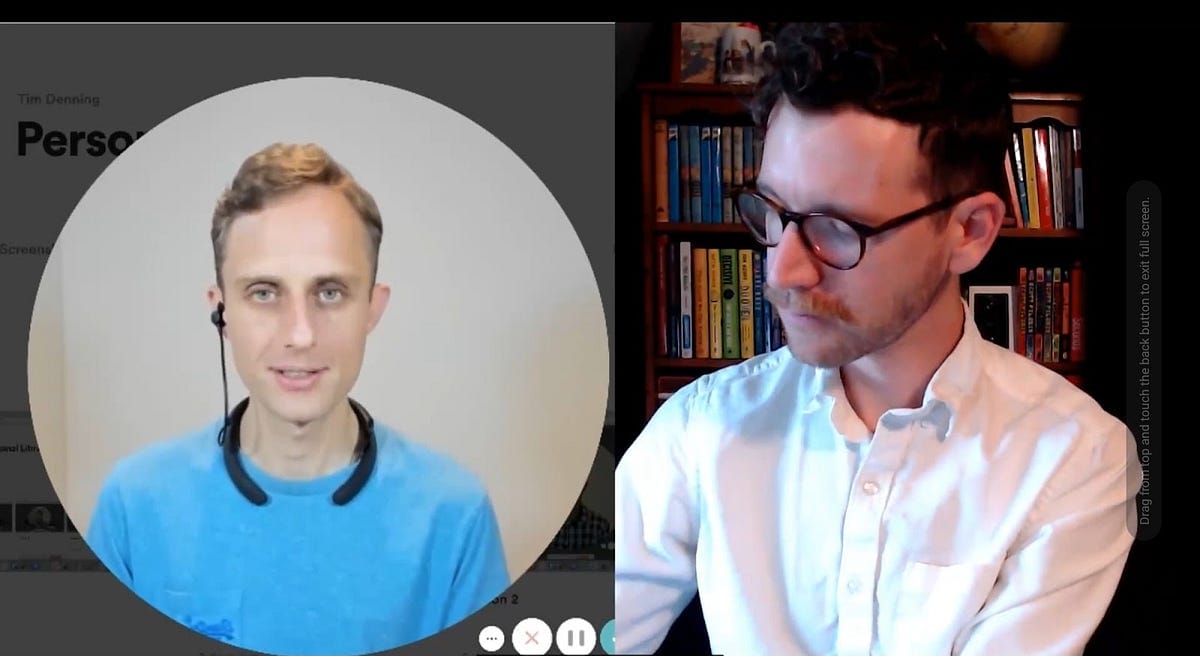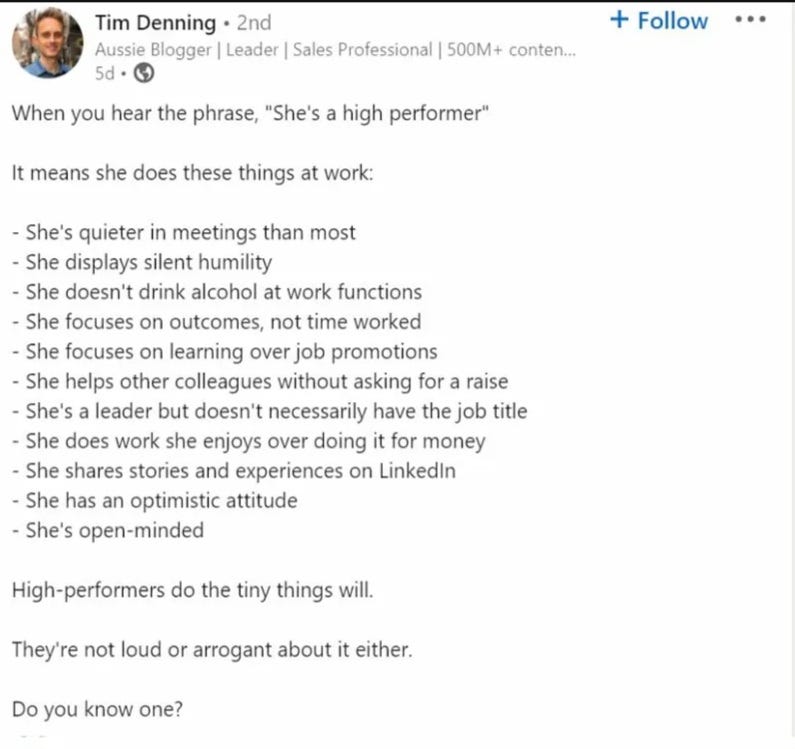In Defense of Tim Denning
He's much nicer than he seems.

I have a confession.
I’ve been taking Tim Denning’s writing courses.
This guy is notorious and writing courses are a pyramid scheme, right?
Nope.
These are unfair judgments about both Tim and writing courses in general.
Sure, there are scammers who sell writing courses, and some people are just bad teachers. Yet for Tim and Todd Brison’s (his co-teacher) courses, I can sincerely say that I learned a ton from them.
The classes are fun, insightful, and we get loads of time to ask questions for our specific situations, so we don’t just get generic advice.
It has also been powerful to be in a group of highly driven, proactive people. They have such a positive influence on me, in a world full of cynicism and negativity.
This doesn’t mean that they’re blindly optimistic, though. When I voice my doubts and fears, my instructors and classmates are understanding and help me work through my problems.
So they do not dismiss or minimize your struggles. In fact, they encourage you to be blunt and honest about your concerns.
From our Q & A sessions, they have bust a lot of misconceptions I had about online writing and businesses.
And about businesses and making an income online…
Money is NOT the Root of All Evil
“Money is bad and dirty.”
So many of us believed that statement without question.
But I never realized how harmful that viewpoint is. If you hate money, money will hate you back.
In fact, money negativity is just as bad as sex negativity.
When you see something as dirty, this prevents you from thinking more critically and learning about it, so you make poor decisions based on things that others have told you.
Without a proper sex education, we could have unprotected sex with strangers, and not know that we can set boundaries to protect ourselves.
We could be clueless in how to ask for or give consent, or pressure ourselves into activities that we find uncomfortable or simply boring.
Similarly, when we get a terrible financial education, we may overspend, not know how to ask for pay raises, waste our money on things that don’t matter, or refuse to invest in things that could help us in the long run.
We could also undersell ourselves and undercharge, believe our employers that we don’t deserve any better, and many other pitfalls.
The Challenge with Donations and Supporting Others
Personally, I like donating to charities, emergency relief funds, and supporting artists I love. Right now, I’m supporting several artists on Patreon, Ko-Fi, Substack, and some other platforms.
This is not to brag, as I know I have some financial privilege. But this is just to show you where I’m coming from.
If you enjoy donating to charities and relief funds, that costs money.
If you want to support artists by paying their standard fees that can cost hundreds or thousands of dollars, rather than just paying them a mere $100 or less on Fiverr, you also need money.
There’s so much talk about artists not getting fair wages, and I agree. But if we want to help artists financially, we can’t do that if we are broke ourselves.
So, I really appreciate learning how to make money online. I’m not saying that I’ll make six figures or anything.
But it would be nice to become financially independent from my parents, even while I live in an expensive city, Toronto.
I love Toronto for the queer and trans friendliness, and the sheer racial diversity, which is awesome for someone like me who is both POC and transgender.
It’s Expensive to Be a Cat Parent, Too
Last year, I also adopted a senior cat. While I love her, her specialty vet food, vet bills, and sometimes even emergency room bills, are not cheap.
I buy pet health insurance to cushion the biggest bills, but since she’s an older kitty, the insurance is costly, too.

For my own job, I work part time as a psychotherapist in private practice. This isn’t as glamorous as it sounds. We have to pay high business expenses just to stay afloat.
These include supervision fees, office rent, software subscriptions, work insurance, professional memberships, and other miscellaneous things.
Thus, if I want to help people in need, support artists, and keep myself and my cat alive, I would need money for all of this.
Wanting more funds, doesn’t have to be some greedy, unethical endeavor. There are ways to make money that are ethical and legitimate.
Finally, I want to talk about Tim Denning as a person.
The Rich White Guy Stereotype
I had believed that all rich people, especially wealthy white men, were wicked and corrupt.
But you know what? That’s just painting everyone with the same broad brush.
Being rich doesn’t make you a bad person. Rather, riches can enable a bad person to do more harm.
In the news, we hear mostly about rich people who do horrible things, because those who do good things are too boring to read about.
With Tim Denning, I find the same thing.
People are so quick to assume that he must be up to no good because he knows how to make lots of money, and is passionate about it.
Tim admits in an article that he’s obsessed with making money, but is that any worse than being obsessed with gaining social media likes and popularity? At least with money, you have the resources to help people.
In a recent newsletter, he told us that he donated six figures to a charity that helps people in a poor country.
You could argue that he’s just doing it for the publicity and to gain our sympathy.
But do we have to be so cynical about everything? Why can’t we believe that people genuinely want to do good and help others?
It doesn’t mean that there are no selfish reasons. I love donating to those in need, but I also enjoy the feeling of being a good person.
But just because you like the pleasure of doing good, doesn’t make your deeds any less beneficial to others.
Imagine if all rich people refrained from donating to charities, because they were scared of looking like pretenders. So many charitable causes would suffer, since most of us don’t have much money to spare.
In the past, I believed that those obsessed with money, must be immoral and cause harm to others. But after getting to know Tim Denning, I’ve revised my beliefs.
You can be fixated on earning money, but still do everything ethically and honestly, work hard to help others, and avoid hurting anybody.
Yes, believe it or not, there are perfectly legal ways to make a lot of money. Not all wealthy folks are scammers. Fraudsters make the news more often, though, because people love controversy.
Bolstering Our Financial Education
Tim’s obsession with making money benefits us, too. If anything, it gives him a deeper understanding into how you can increase your income, and he teaches these skills to others.
You might argue that he won’t teach you unless you pay him. That is actually false.
He has written numerous articles available to the public for free, with plenty of tips on making money that most people have never even heard of.
Honestly, my financial education has become so much better since reading his articles on money. My financial education from my parents was woefully impoverished.
Of course, if you buy his courses, you also get to see tons of case studies, and concrete examples help you learn better.
But even in his articles free for the public, he gives us lots of examples on how you can make more money online.
If you find reading about finances distasteful, you can just ignore them. There’s no need to make a stink and ruin the experience for readers who do enjoy reading them.
Aside from Tim’s attitudes towards money, let’s talk about how he treats people.
He’s Much Nicer Than He Seems
Yes, he comes off as provocative and tough nuts in his articles.
But if you look past the tough love, you’ll see that he actually has a lot of compassion. He cares about people, and wants them to be happy and successful.
In stark contrast, I’ve met people who say sweet, honeyed things to me with promises of feminism, progressiveness, inclusion, yada yada. But in the end, they still treated me and others like shit.
It’s the classic “judge them by their actions, not their words.”
While Tim can push us a lot and believe in hard work, he does not believe that poor people are lazy. Instead, he says that what’s holding them back is a lack of financial education.
He himself was dead broke before, and his life improved after watching Tim Ferris’ YouTube videos on finance.
Speaking of, many of us assume that someone who values hard work, must worship capitalism and be okay with worker exploitation, racism, sexism, homophobia, transphobia, and ableism.
But from what I’ve seen with Tim, he does not support any of these atrocities. For instance, he teaches people to value themselves, and not be gaslit by unscrupulous employers.
He Also Creates Free Classes for the Poor
Once, I asked him what he thought about the purchasing power parity, since I saw it on the Gumroad sales page.
The purchasing power parity lets you charge a lower fee for customers from a third world country.
Tim told me that he used it in the past, but it kept glitching. Often, an American customer would get the third world country fee and vice versa, so it was a mess.
But he doesn’t like the idea of barring people in poor countries from getting help. Instead, he creates scholarships for those who cannot afford the courses.
He also has some lower cost courses, and even some free workshops for folks who cannot pay.
If you didn’t know, Tim runs free webinars from time to time. These are fun and educational. Of course he will promote his courses at the end, but again, if you’re not interested in them, you can just ignore them.
The people who are interested in the courses, however, will get the benefit of watching Tim in action, so they get a taste of how he’s like as a teacher.
Either way, even folks who can’t pay can gain value from these lessons. Just a week ago, Tim gave blunt and honest critiques for people who submitted their work to him.
He warned that he would be harsh, and look through the eyes of a tired and cynical reader. It was a super informative lesson!
He Supports LGBTQ+ People
He is an ally to queer and trans people as well. In one of our content critique workshops, I submitted my article: “I’m a Gay Man But Have Feelings for a Female Friend.”
In short, my article was about the fluidity of sexual orientation, which can be a taboo topic.
Tim gave me some feedback on how to make my article stronger.
He tells us about what works and doesn’t work on different writing platforms, too.
So he admitted that on LinkedIn, my story may not do that well, because LinkedIn is wary of “controversial” content. He feels sad about that, because this is an important topic, and it shouldn’t be this way.
Moreover, when I mentioned that my article was not boosted, he was also sympathetic.
He noted that I had a lot of engagement — I had 1.1 K claps and 20+ comments at the time. It has 1.6K claps and 30+ comments now.
He said that people clearly liked it and it should have been boosted, but Medium doesn’t always reward quality.
That encouraged me as a writer, and I felt happy that Tim takes a clear stance on supporting queer people.
Now, I want to debunk some wrong ideas people have about him.
An Awful Misunderstanding
Tim wrote that he suffered from an eating disorder and depression, but he has since overcome his mental illnesses.
I personally found that story very inspiring and uplifting.
However, some folks thought he meant that we can get over our mental illnesses, which is offensive to those who can’t “get better,” such as those with bipolar, OCD, autism, ADHD, etc.
Yet, he was talking about his own experiences, not other people’s. From what I recall, nowhere does he diminish folks with mental illnesses, nor is he saying that mental health issues are dismissible.
Also, some people do manage to get out of their depression and eating disorders. It’s strange to me why we would resent a guy who is no longer tormented by those struggles.
From what I’ve observed in our courses, he doesn’t minimize anybody’s mental health challenges, either. And many of us have been open about our mental health concerns.
He is supportive of neurodivergent people as well. I asked him to critique a Twitter essay I wrote on autism, based on my lived experiences.
Tim praised me for having a lot of personality and humor in my story, which is what performs well on Twitter.
He also gave me suggestions on how to make my message clearer and stronger.
Just think: would someone with a pooh-pooh attitude towards neurodivergents, actually help me with such enthusiasm? No, they would just tell me to stop writing about that “nonsense.”
They wouldn’t want to empower me in writing openly about autism.
An Even Worse Misunderstanding
A couple of years ago, Tim published this post on LinkedIn:

Text reads:
When you hear the phrase, “She’s a high performer”
It means she does these things at work:
-She’s quieter in meetings than most
-She displays silent humility
-She doesn’t drink alcohol at work functions
-She focuses on outcomes, not time worked
-She focuses on learning over job promotions
-She helps other colleagues without asking for a raise
-She’s a leader but doesn’t necessarily have the job title
-She does work she enjoys over doing it for money
-She shares stories and experiences on LinkedIn
-She has an optimistic attitude
-She’s open-minded
High-performers do the tiny things well.
They’re not loud or arrogant about it either.
Do you know one?
Tim actually deleted this post, but not before a writer screenshotted it and denounced him in an article.
She was infuriated, because Tim Denning, in her opinion, was advocating that women be humble, quiet, and help others without asking anything in return.
At the time, I didn’t question her. I even joined her in scolding Tim.
When he deleted this post after getting a lot of flak, the writer saw this as evidence that he was culpable.
Now that I know a lot more about Tim, I have a better grasp on what might have happened.
Firstly, why do we assume that when someone takes down a post, they must be doing it to cover their crimes?
If anything, given what I know about Tim, he was probably mortified that his post could be harmful to women, regardless of his intentions.
Impact can matter more than intention, after all.
In fact, I am very sensitive to misogyny, even more so after my gender transition. But never have I heard Tim make mean jibes at women. He also looks up to his wife, who is an engineer, and he adores his daughter.
He treats the women in our courses with just as much respect as he does the men, too.
Moreover, I don’t think his LinkedIn post was about women in particular. It sounded more like his opinion on all workers.
He might have said “she” because he wanted to praise female high performers, since male high performers get enough attention already. But unfortunately, this backfired on him.
Normally, he is a bold guy who sticks to his guns and never removes his posts. So for him to take down this post, he must have been genuinely concerned.
Honestly, a lot of us have an instinctive distrust towards men in powerful positions. So we assume that they must be misogynistic, no matter how much evidence there is to the contrary.
Tim, I’m sorry that I had been wrong about you, too.
Final Thoughts
All in all, I am disturbed by how quickly people jump to conclusions about somebody on the internet.
They judge someone as a bad person just because of some post they read. And this depends on how they interpreted these posts.
Their friends may also leap to conclusions, and they believe what their friends say without question.
I have also been distrustful in the past, merely because he’s a rich white man. But I do feel ashamed of my knee jerk reactions now.
No, I’m not saying he’s a perfect angel. Of course I don’t agree with every single thing he says.
But that’s with everyone. Nobody is flawless and I will never find anyone on Earth I will agree with 100% of the time.
How about you? How have your interactions with Tim Denning been? Either through reading his articles, watching him in webinars, or even being a student?
Do you agree that people jump to conclusions too quickly these days?
Join my newsletter for more fascinating stories about human psychology!



